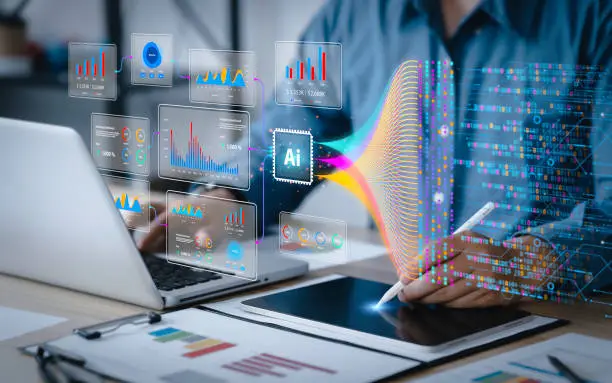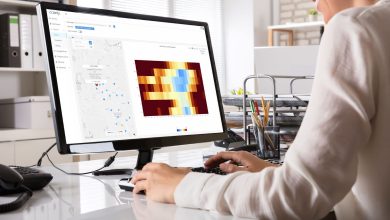
Artificial intelligence (AI) is developing at a frenetic pace, and it is provoking innovation sector by sector, transforming human connection with technology. The latest AI trends are pushing boundaries on what might have previously been considered unthinkable, affecting business processes through scientific investigation to consumer interactions. Companies and engineers are scrambling to keep up with these developments, driving the transformation to an AI future. When AI transforms industries, comprehending these shifts is pivotal for individuals interested in capitalizing on new possibilities and creating impactful change.
The Evolution of Generative AI and Language Models
Generative AI has taken the tech world by storm, with models like OpenAI’s GPT series and Google’s Gemini redefining how machines understand and generate human language. These AI systems are now capable of producing text, images, and even video content with remarkable coherence and creativity. The ability of AI to create personalized content is being leveraged in marketing, customer service, and education, making businesses more efficient while enhancing user engagement.
With generative AI continuing to evolve, new applications across sectors are being discovered, such as AI-fueled programming, journalism, and computer art. AI-driven chatbots and virtual assistants are growing more sophisticated, delivering experiences that mimic those of humans and boost productivity and convenience. Companies that adopt these AI technologies are reaping the benefit of having a competitive edge through automating high-complexity tasks and improving customer experience.
AI in Healthcare and Biotechnology
The impact of AI on medicine is among the most promising trends of recent years. From diagnosing diseases to discovering medicines, AI is improving patient outcomes and reducing the time to bring medical innovations to market. Machine learning algorithms are now used to interpret medical images with more accuracy than ever, allowing doctors to diagnose conditions like cancer and neurological disorders at their earliest possible stages. Robotic surgery is also becoming more accurate with the help of AI, decreasing recovery times and enhancing success rates.
Beyond diagnostics, AI is revolutionizing drug development. By modeling the interaction of molecules and predicting the effectiveness of new molecules, AI is fast-tracking the discovery of new drugs and getting them to market. Personalized medicine, in which AI reads a patient’s genetic information to recommend customized treatments, is becoming a reality, offering more effective and targeted therapies.
AI-Powered Automation and Workforce Transformation
As more companies use artificial intelligence in their operations, automation is remolding the workforce. AI-enabled solutions are streamlining mundane activities and allowing human workers to focus on innovative and strategic responsibilities. In finance, for instance, automation driven by AI is making fraud detection more effective, improving risk assessment, and streamlining customer service activities.
Manufacturing is also an industry that is experiencing the effects of AI automation. AI enables intelligent factories to monitor equipment, predict maintenance needs, and optimize supply chains. AI-powered robots are maximizing efficiency on factory floors, reducing waste, and increasing overall productivity. Being able to integrate AI into industrial processes is transforming the manner in which businesses operate, enhancing efficiency and profitability.
However, with the greater utilization of AI automation are some challenges. With some jobs being made obsolete, employees must catch up by acquiring AI-specific skills that will enable them to compete in the emerging job market. AI-specific knowledge will always be in demand by engineers, data scientists, and computer program developers. For those interested in transitioning into AI-focused careers, exploring remote positions can provide exciting opportunities to work on innovative projects and contribute to the AI revolution.
The Role of AI in Cybersecurity and Data Protection
With artificial intelligence becoming more common in business and everyday life, cybersecurity is becoming a more pressing concern. AI is utilized to scan for cyber attacks in real time, tracking patterns of network traffic and identifying probable vulnerabilities before they can be exploited. AI-powered security systems can identify and counter cyberattacks before the conventional methods, providing better protection overall for both individuals and organizations.
Data privacy is another key area where AI is making an impact. AI-powered encryption algorithms are strengthening data security, ensuring sensitive information is protected from unauthorized access. Companies are also implementing AI-driven compliance tools to adhere to evolving regulations and avoid data breaches. As cyber threats become more sophisticated, AI’s role in cybersecurity will continue to expand, helping businesses safeguard their digital assets.
The Rise of AI Ethics and Responsible AI Development
With advancements in AI, ethical issues are gaining more attention. Issues related to AI bias, data privacy, and transparency are at the forefront of responsible AI development discussions. Organizations are now shifting towards creating ethical AI frameworks to encourage fairness and accountability in AI-based decision-making.
Governments and regulatory bodies are developing policies to govern the use of AI, ensuring that AI technologies are aligned with human rights and social values. Companies investing in AI ethics are focusing on creating explainable AI models that provide insight into how decisions are being made. As AI becomes more integrated into critical systems, from recruitment to law enforcement, responsible AI development will be essential in maintaining the public’s trust and mitigating unintended consequences.
AI and the Future of Smart Cities
AI is also leading the way in developing smart cities, where data-driven technologies enhance urban living. AI-powered traffic management systems are reducing congestion and optimizing transportation, while smart energy grids optimize electricity distribution based on real-time demand. AI is also being utilized by cities for environmental monitoring, with machine learning models forecasting air quality, detecting sources of pollution, and fighting climate change impacts.
Another area where AI is making a difference is in public safety. AI-powered surveillance systems can analyze video content to identify potential threats, helping law enforcement agencies respond more effectively to security violations. Predictive analytics are being used to predict crime patterns and deploy resources in advance, improving overall city safety.
The Future of AI and Human Collaboration
With the evolution of AI, the focus is now on the collaboration of AI with humans and not replacing human employment. AI is being created to enhance human capabilities, assisting professionals in law, medicine, and engineering. AI-powered decision support systems are providing real-time analysis, allowing professionals to make informed decisions and solve complex issues better.
The future of AI will be characterized by more blending with augmented reality (AR) and virtual reality (VR) to generate immersive experiences that generate productivity and creativity. AI-powered personal assistants will get more intelligent, with the ability to perform a range of tasks. As more collaboration occurs between humans and AI, individuals and businesses will discover new ways to utilize AI as an innovation and problem-solving driver.
Conclusion
The latest AI trends are reshaping the future in profound and meaningful ways, ranging from transforming healthcare and industry automation to improving cybersecurity and encouraging ethical AI innovation. With AI advancing, professionals and businesses must adapt to emerging technological paradigms, embracing AI-driven innovations that optimize efficiency and drive progress.
For those who want to build careers in AI, being ahead of the curve when it comes to emerging trends is essential. The demand for AI engineers and data scientists is increasing, which offers great opportunities to work on cutting-edge projects that redefine technology. With AI-powered automation, ethical AI development, or creating intelligent systems, the future of AI holds enormous possibilities for those willing to innovate and drive the fast-changing field.




